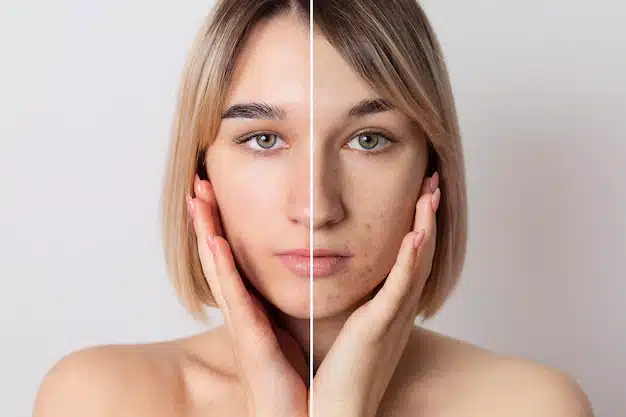Acne is a common skin condition that affects many people, especially during their teenage years. While it can be a nuisance, there are ways to manage it and keep your skin clear. One of the most effective ways is to establish a skincare routine specifically tailored to acne-prone skin.
In this article, we’ll discuss the best skincare routine for acne-prone skin, including the products and steps you should include in your daily routine to achieve clear, healthy skin.
-
Cleanse your skin twice a day
The first step in any skincare routine is cleansing. When it comes to acne-prone skin, it’s essential to cleanse your skin twice a day – once in the morning and once at night – to remove impurities and excess oil that can clog pores and lead to breakouts.
It’s important to choose a gentle, non-comedogenic cleanser that won’t strip the skin of its natural oils. Look for ingredients like salicylic acid or benzoyl peroxide, which can help unclog pores and prevent breakouts. Avoid cleansers that contain alcohol, as they can dry out the skin and lead to overproduction of oil, which can make acne worse.
-
Use a toner
After cleansing, use a toner to help restore the skin’s natural pH balance. Toners also help to remove any remaining impurities and prepare the skin for the next step in your routine – moisturizing.
Again, look for ingredients like salicylic acid or benzoyl peroxide to help fight acne. Avoid toners that contain alcohol, as they can dry out the skin.
-
Moisturize
It may seem counterintuitive, but even acne-prone skin needs to be moisturized. In fact, not moisturizing can actually make acne worse by causing the skin to produce more oil to compensate for dryness.
Choose a lightweight, oil-free moisturizer that won’t clog pores. Look for ingredients like hyaluronic acid or glycerin, which can help hydrate the skin without leaving it feeling greasy.
-
Apply a spot treatment
If you’re dealing with active breakouts, it’s important to use a spot treatment to help clear the acne and prevent further breakouts. Look for products that contain benzoyl peroxide or salicylic acid, which can help to unclog pores and reduce inflammation.
-
Exfoliate
Exfoliating is an important step in any skincare routine, but it’s especially important for acne-prone skin. Exfoliating helps to remove dead skin cells and unclog pores, which can help to prevent breakouts.
It’s important to choose an exfoliant that is gentle on the skin, such as a chemical exfoliant containing salicylic acid or alpha hydroxy acids (AHAs) like glycolic acid or lactic acid. Avoid physical exfoliants like scrubs, as they can be too harsh on acne-prone skin and cause irritation.
-
Use sunscreen
Sun exposure can make acne worse, so it’s important to protect your skin with sunscreen every day, even on cloudy days. Look for a sunscreen that is non-comedogenic and provides broad-spectrum protection.
-
Don’t pick or pop your acne
While it can be tempting to pick or pop your acne, it’s important to resist the urge. Picking or popping your acne can cause further inflammation and lead to scarring.
-
Maintain a healthy diet
Eating a diet that is high in processed foods and sugar can cause inflammation in the body and make acne worse. To promote clear, healthy skin, it’s important to eat a diet that is rich in fruits, vegetables, and lean proteins. Foods that are high in vitamins A and E, as well as omega-3 fatty acids, can help to reduce inflammation and improve the health of your skin.
It’s also important to stay hydrated by drinking plenty of water throughout the day. Drinking water can help to flush out toxins and keep your skin looking healthy and clear.
In conclusion, having a skincare routine specifically tailored for acne-prone skin is crucial for managing and preventing breakouts. By following the steps outlined above, you can achieve clear, healthy skin and boost your confidence. Remember to be consistent and patient, as it may take some time to see the results. And, it’s always a good idea to consult a dermatologist to get professional advice.
